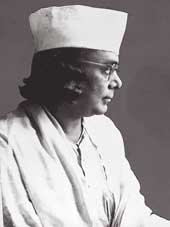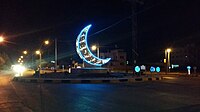O Mon Romzaner Oi Rozar Sheshe
 From Wikipedia the free encyclopedia
From Wikipedia the free encyclopedia
| "O Mon Romzaner Oi Rozar Sheshe Elo Khushir Eid" | |
|---|---|
 Kazi Nazrul Islam, composer of the song | |
| Song | |
| Language | Bengali |
| English title | Oh, at the end of the fasting of Ramadan, Eid has arrived! |
| Published | 1931 |
| Genre | Nazrul Geeti |
| Songwriter(s) | Kazi Nazrul Islam |
| Composer(s) | Kazi Nazrul Islam |
| Lyricist(s) | Kazi Nazrul Islam |
O Môn Rômzaner Oi Rozar Sheshe Elo Khushir Eid (Bengali: ও মন রমজানের ঐ রোজার শেষে এলো খুশির ঈদ) is the most notable Bengali Eid-ul-Fitr song, written by Kazi Nazrul Islam, the national poet of Bangladesh. It is a very common tune heard in Bengali households around the world. The song was written and composed at the request of Nazrul's disciple, Abbasuddin Ahmed in 1931.[1] It has been covered by many artists around the world. The song is written on the end of the period of fasting and the Bengali celebration of Eid-ul-Fitr.[2] This was regarded by his contemporaries as a significant achievement, as Bengali Muslims had been strongly averse to devotional music.[3]
First Recording[edit]
In 1931, four days after the song was written, it was first recorded in the voice of the artist Abbasuddin Ahmed. The song was set to the Pilu as its raga and keherwa for its tala (rhythm).[4] Two months after the recording, the record was released just before Eid al-Fitr. Gramophone Company released this record. The other song on the record was the poet's "Islamer Oi Souda Loye Elo Navin Sodagar, Bodnasin Aay, Aay Gunahgar Notun Kore Soda Kor." The record number of His Masters Company was N-4111. The song was released in February 1932. At the time of recording the song, Abbas Uddin Ahmed was only 23 years old. He had not yet made his full debut as a folk singer. But this song established him as a popular folk singer. In the years following the recording, Abbas Uddin Ahmed gained popularity by singing the song at various events. After the partition of India in 1947, Abbas Uddin Ahmed moved to India. But the song became equally popular in India and Bangladesh.
History[edit]
The song "O Mon Ramjaner Oi Rojar Sheshe Elo Khushir Eid" is an essential part of the Eid festival for Bengali Muslims. This song was composed by Kazi Nazrul Islam, the national poet of Bangladesh. On May 25, 1931, this song was recorded for the first time. Kazi Nazrul Islam himself was also the composer of the song.
There is a story behind the composition of this song. Abbasuddin Ahmed was a famous musician. He was also a disciple of Nazrul. One day, Abbasuddin told Nazrul, "You write many beautiful songs. But there are very few Islamic songs in Bengali. If you write Islamic songs in Bengali, your songs will be played in every Muslim home."
Nazrul was very happy to hear Abbasuddin's words. He told Abbasuddin, "I will fulfill your request. I will write a song for Eid al-Fitr."
Abbasuddin was very happy to hear Nazrul's words. He requested Nazrul to write the song.
Nazrul started writing the song. He highlighted the joy and happiness of Eid al-Fitr in the song. He also mentioned the history and tradition of Islam in the song.
Within a few days, Nazrul finished writing the song. He played the song for Abbasuddin. Abbasuddin was very impressed by the song. He prepared to record the song.
On May 25, 1931, this song was recorded for the first time. The song was recorded by the His Masters Company. After the song was recorded, it instantly became popular throughout Bengal. The song was widely circulated among Bengali Muslims.
This song is still a traditional song of Eid al-Fitr for Bengali Muslims. Every year on Eid al-Fitr, Muslims express their joy and happiness by listening to this song.
Lyrics[edit]
The lyrics of the song are presented here in the same spelling as it was written when it was published in 1931. Some words of old orthography may not conform to modern Bengali orthography.
Lyrics and romanization:
ও মন রমজানের ঐ রোজার শেষে এলো খুশির ঈদ,
তুই আপনাকে আজ বিলিয়ে দে, শোন আসমানী তাগিদ।
তোর সোনা-দানা, বালাখানা সব রাহে লিল্লাহ
দে যাকাত, মুর্দা মুসলিমের আজ ভাঙাইতে নিঁদ,
ও মন রমজানের ঐ রোজার শেষে এলো খুশির ঈদ।আজ পড়বি ঈদের নামাজ রে মন সেই সে ঈদগাহে,
যে ময়দানে সব গাজী মুসলিম হয়েছে শহীদ।
ও মন রমজানের ঐ রোজার শেষে এলো খুশির ঈদ।আজ ভুলে যা তোর দোস্ত-দুশমন, হাত মেলাও হাতে,
তোর প্রেম দিয়ে কর বিশ্ব নিখিল ইসলামে মুরিদ।
ও মন রমজানের ঐ রোজার শেষে এলো খুশির ঈদ।যারা জীবন ভরে রাখছে রোজা, নিত্য উপবাসী,
সেই গরীব ইয়াতীম মিসকিনে দে যা কিছু মুফিদ,
ও মন রমজানের ঐ রোজার শেষে এলো খুশির ঈদ।
আপনাকে আজ বিলিয়ে দে শোন আসমানী তাগিদ।ঢাল হৃদয়ের তশতরীতে শিরনি তৌহিদের, তোর দাওয়াত কবুল করবেন হজরত হয় মনে উম্মীদ।
ও মন রমজানের ঐ রোজার শেষে এলো খুশির ঈদ।তোরে মারল' ছুঁড়ে জীবন জুড়ে ইট পাথর যারা,
সেই পাথর দিয়ে তোলরে গড়ে প্রেমেরই মসজিদ।
ও মন রমজানের ঐ রোজার শেষে এলো খুশির ঈদ,
আপনাকে আজ বিলিয়ে দে শোন আসমানী তাগিদ।Ō mana ramajānēra ai rōjāra śēṣē ēlō khuśira īda,
tu'i āpanākē āja biliẏē dē, śōna āsamānī tāgida.
Tōra sōnā-dānā, bālākhānā saba rāhē lillāha dē yākāta, murdā musalimēra āja bhāṅā'itē nim̐da, ō mana ramajānēra ai rōjāra śēṣē ēlō khuśira īda.Āja paṛabi īdēra nāmāja rē mana sē'i sē īdagāhē, yē maẏadānē saba gājī musalima haẏēchē śahīda.
Ō mon ramajānēra ai rōjāra śēṣē ēlō khuśira īda.Āja bhulē yā tōra dōsta-duśamana, hāta mēlā'ō hātē, tōra prēma diẏē kara biśba nikhila isalāmē murida. Ō mana ramajānēra ai rōjāra śēṣē ēlō khuśira īda.
Yārā jībana bharē rākhachē rōjā, nitya upabāsī, sē'i garība iẏātīma misakinē dē yā kichu muphida, ō mana ramajānēra ai rōjāra śēṣē ēlō khuśira īda.Āpanākē āja biliẏē dē śōna āsamānī tāgida.
Ḍhāla hr̥daẏēra taśatarītē śirani tauhidēra, tōra dā'ōẏāta kabula karabēna hajarata haẏa manē um'mīda. Ō mana ramajānēra ai rōjāra śēṣē ēlō khuśira īda.
Tōrē mārala' chum̐ṛē jībana juṛē iṭa pāthara yārā, sē'i pāthara diẏē tōlarē gaṛē prēmēra'i masajida.
Ō mana ramajānēra ai rōjāra śēṣē ēlō khuśira īda, āpanākē āja biliẏē dē śōna āsamānī tāgida.
Translation:
O heart, happy Eid came at the end of that Ramadan fast,
Give yourself away today, listen to the heavenly exhortation.
Your gold-beads, bracelets,
All the way to Lillah,
Give zakat,
To wake up the dead Muslim today,
O mind, happy Eid came at the end of that Ramadan fast.
Today I will read Eid prayers, o my heart, in that Eidgah,
The ground on which all Ghazi Muslims have been martyred.
O heart, happy Eid came at the end of that Ramadan fast.
Forget what your friend and foe do today, shake hands,
With your love, the world is a disciple of worldwide Islam.
O heart, happy Eid came at the end of that Ramadan fast.
Those who are full of life, fasting, constantly fasting,
Give to the poor orphan miskin, whatever is beneficial,
O heart, happy Eid came at the end of that Ramadan fast,
Give yourself today,
Listen to the heavenly exhortation.
Pour the sweetness of Tauhid in the saucer of the heart,
The honourable will accept your invitation, I hope.
O mind, happy Eid came at the end of that Ramadan fast.
Those who threw bricks and stones at you all their lives,
Build a mosque of love with that stone.
O heart, happy Eid came at the end of that Ramadan fast,
Give yourself today,
Listen to the heavenly exhortation.
References[edit]
- ^ Shams Arefin (17 July 2015). "Nazrul & O Mon Romzaner Oi Rozar Sheshe". Jugantor.
- ^ "10 key events in Kazi Nazrul's life". The Daily Star. 27 August 2015. Retrieved 26 February 2016.
- ^ Kamrunnessa Azad. 2001. Dharmiya Chetonay Nazrul. Nazrul Institute, Dhaka. 1999. pp. 173–174
- ^ ও মন রমজানের ঐ রোজার শেষে এলো খুশীর ঈদ. Nazrul Geeti (in Bengali). Archived from the original on 11 July 2016.


